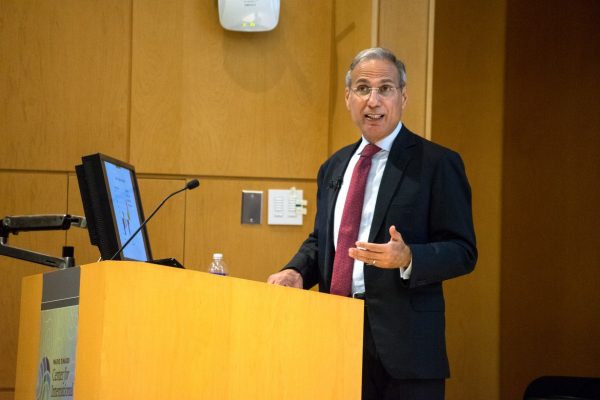
As the humanitarian crisis of the Syrian Civil War claims thousands of lives in the Middle East, it has also costed the economies of neighboring countries billions of dollars, including Lebanon, said Raed H. Charafeddine, first vice-governor at Lebanon’s central bank, Banque du Liban.
“Taking into account an extended political deadlock, global financial volatility, the conflict has cost Lebanon more than $14.4 billion so far, equivalent to a cumulative loss of almost 30 percent of our GDP,” Charafeddine said.
A large of the cost was driven by Syrian families who escaped deadly violence at home and found safety in Lebanon, he said.
“The displaced Syrians have accounted for 40 percent of total primary health care visits. This has made it harder for Lebanese nationals to get access to health care,” Charafeddine said.
Refugees have put a strain on the Lebanese health sector, with the number of displaced individuals now constituting a third of the Lebanese population, according to Charafeddine.
“The majority of the displaced Syrians live in 225 of the poorest localities in Lebanon, which has exacerbated the suffering of the Lebanese people,” he said.
Since the Syrian war, the Lebanese tourism, banking and real estate industries were hit by the crisis itself, not by the refugee population, Al Jazeera reported in July.
Consumption and investment among refugees have reportedly helped alleviate some of the costs associated with the influx. Syrian refugees pay more than $1 million in daily rent across Lebanon and spend more than $22 million every month on food, the report said.
While the refugee influx has placed a burden on Lebanese public services and infrastructure, the report said that Syrians have “bolstered” Lebanon’s economy by working in local businesses and contributing to rental property owners and the real estate market.
Charafeddine said in his lecture that Lebanese officials outlined a comprehensive proposal in 2015 which incorporated actors from the international community.
From the central bank’s perspective, Charafeddine said the magnitude of the impact of the war on its assets has been colossal.
“The conflict has put pressure on the reserves of the Central Bank because every year $2 billion of our reserves are depleted and are going out of Lebanon,” he said.
In response to the extensive economic effects of the Syrian crisis, Charafeddine called on other nations to be more responsive to Lebanon’s requests for aid.
“Lebanon is in a difficult situation. It faces the substantial cost of hosting displaced Syrians, but without the ability to sufficiently acquire the global support needed to manage this burden successfully,” he said.
“The plan covers the refugees needs from 2016-20 and requires over $11 billion in support from donor countries, ranging from grants, to loans for development projects,” Charafeddine said.
The plan was drafted to improve refugee conditions by making investments in education, infrastructure and employment programs, he said.
With regards to international donors, Charafeddine discussed the gap between what is being said and what is being done.
“Between the pledged amounts and the dispersed amounts, the gap is 50 percent,” he said.
Charafeddine talked about investments which would yield long-term benefits to the refugees and the Lebanese people.
“Funding for infrastructure, would not only provide job opportunities for Lebanese and Syrians, it would also lay the foundation for all inclusive improvements in productivity, growth, employment and development,” he said.

Leave a Reply
You must be logged in to post a comment.